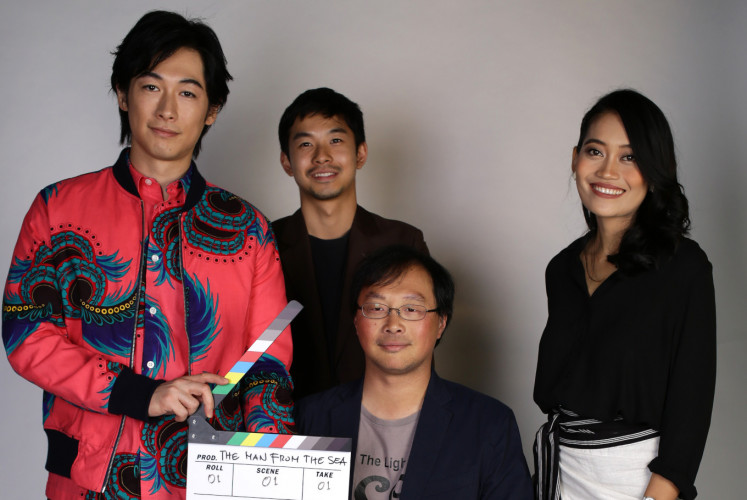Popular Reads
Top Results
Can't find what you're looking for?
View all search resultsPopular Reads
Top Results
Can't find what you're looking for?
View all search results‘The Man from the Sea (Laut)’: Between tsunamis, love and identity
The Man from the Sea (Laut) discusses more than just tsunamis and the relationship between Japan and Indonesia.
Change text size
Gift Premium Articles
to Anyone
A
man is found unconscious on a beach in Aceh. The man, who later will be named Laut, is a character played by Japanese actor Dean Fujioka in The Man from the Sea (Laut), a collaborative film project between Japan and Indonesia.
Suffering from amnesia, he is then taken under Atsuko’s (Mayu Tsuruta) care, a Japanese women who works for a non-profit organization focusing on tsunami disaster recovery. Laut is involved in the daily life of Atsuko’s son Takashi (Taiga), Atsuko’s relative Sachiko (Junko Abe) and their Indonesian friends Ilma (Sekar Sari) and Kris (Adipati Dolken). However, Laut still becomes an enigma among them as he apparently has magic powers, including forming drops of water with his fingers and teleportation.
Helmed and penned by Koji Fukada, The Man from the Sea (Laut) takes place after the tsunami that hit the province in 2004. Questions about Laut’s identity and purpose may be sparked among the audience soon after they watch it. The film does not explicitly answer either question, but allows people to play with their own interpretations.
“Hopefully each viewer will […] think about the meaning of nature, life and tsunamis after watching the film,” said Koji Fukada on Monday, Dec. 17 at The Jakarta Post office. “Hopefully they have time to think about all that after seeing it.”
Shot in Aceh, the film highlights other topics that can be further analyzed as well, starting from identity, love to religion and the history between Indonesia and Japan.
Having been released in May, The Man from the Sea (Laut) has been shown at various film festivals, including the Busan International Film Festival, the 13thJogja-NETPAC Asian Film Festival and the Hong Kong Asian Film Festival. It was also picked to close the 2018 Japan Film Week this month.
In a post-screening discussion at the 2018 Japan Film Week on Sunday, Dec. 16, at CGV Grand Indonesia, Central Jakarta, Fukada spoke about his experience traveling to Banda Aceh city in 2011, which inspired the birth of the movie. “During those times, I sensed the differences between both countries, particularly in how people responded to the tsunamis and in perceiving life and death,” Fukada said.
Read also: Indonesia, Japan collaborate in fantasy drama film set in Banda Aceh
Cast and director of 'The Man from the Sea (Laut)'; Dean Fujioka (left), Taiga (Second left), Sekar Sari (right) and Koji Fukada, during their interview on Monday, Dec. 17, at The Jakarta Post office in Central Jakarta. (JP/Wienda Parwitasari)He gave an example of the diesel-fueled power plant (PLTD) Apung ship that was carried by the tsunami around 6 kilometers inland that has since become a tourist attraction. “But in Japan, such ships have been removed as they recall bad memories,” said the director of the Cannes-winning Harmonium.
As a collaborative project, it features crew members from both countries. At the same post-screening discussion, co-producer Meiske Taurisia elaborated about the crew composition. “There were many preparations prior to shooting, the most crucial one was providing translators for the director, director of photography and lighting director,” said Meiske. “The rest [of the crew] was from Indonesia, including the penata artistik [art director] and costume [design].”
When it comes to the actors, among the chosen ones were actor-musician Dean Fujioka, whose birthplace was in Fukushima prefecture, which was affected by the 2011 earthquake and tsunami, and actor Taiga (Harmonium). Fukada also featured Indonesian actors, namely Sekar Sari (Siti) and Adipati Dolken (Posesif).
Taiga’s character, Takashi, is an Indonesian who was born with Japanese and Indonesian parents. His interaction with Ilma and Kris gives audiences a humorous perspective in seeing nationality. Taiga himself gained a new nickname, Taiga Manja (spoiled Taiga), due to the film.
Meanwhile, for people who live outside Aceh, the province has its own stigma, especially relating to religion and sharia. But it is different in the eyes of the actors, including Adipati. “Aceh actually has interesting places, including its sea, that could be a great location for something [film shooting],” Adipati told the Post after the post-screening discussion.
In addition, Sekar believed that the film had a certain effect on the audience, either directly or days after. "Several people have said this film has its own after-taste," she said.
As for their forthcoming projects, Taiga, Sekar and Fukada are in preparation on their films, while Fujioka plans to hold a tour to Taiwan and Hong Kong for his new album. “Hopefully in Indonesia as well,” Fujioka said during an interview at the Post’s office. “[…] I’d like to share my journey with our friends in Indonesia.”
Produced by Japan-based Nikkatsu, Indonesia-based Kaninga Pictures and France-based Comme Des Cinémas, The Man from the Sea (Laut) is set to be screened across Indonesia in January next year. (mut)












